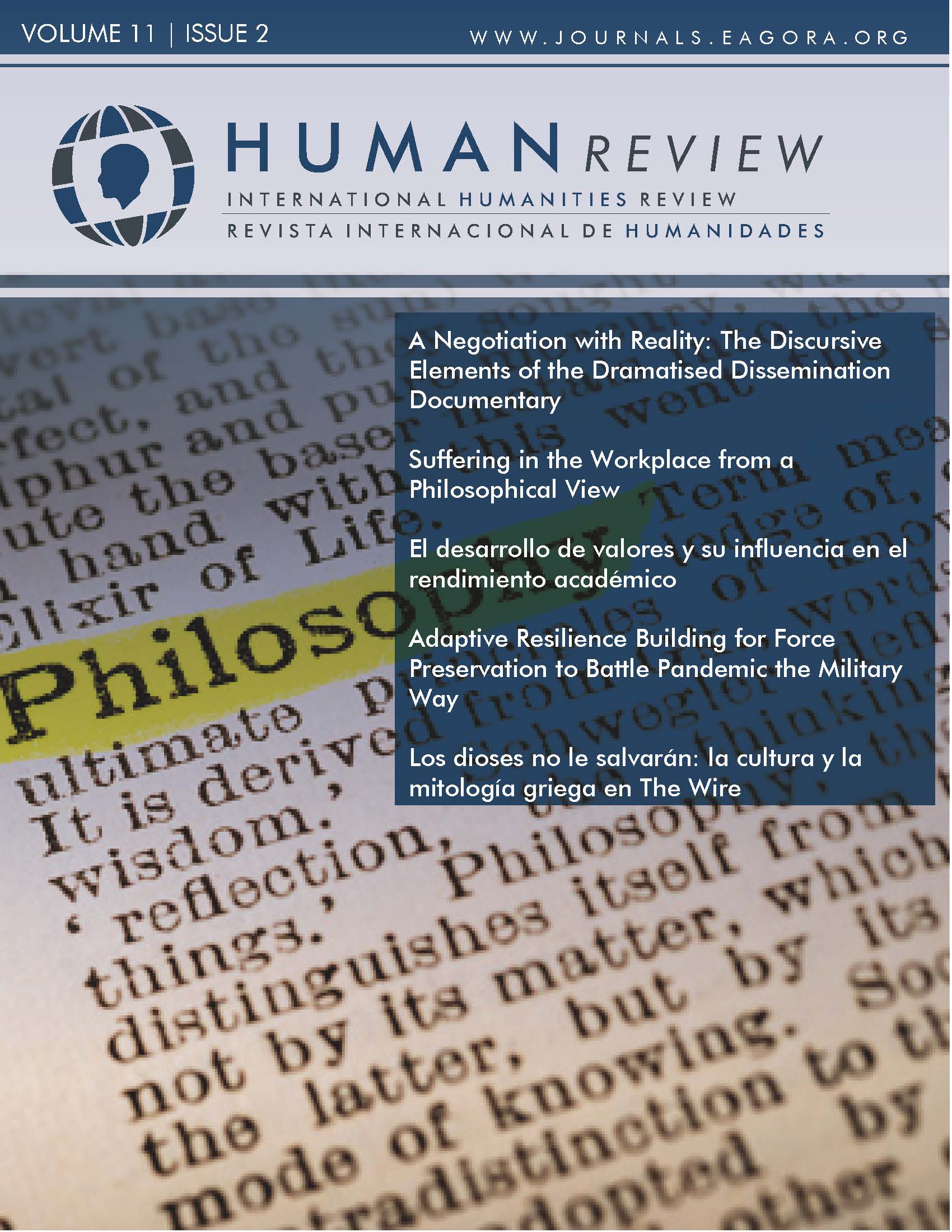Minds vs Machines
Historical and logical-philosophical review of the Lucas-Penrose’s Gödelian argument
DOI:
https://doi.org/10.37467/revhuman.v11.4503Keywords:
Gödel’s Theorem, Artificial Intelligence, Mechanism, Free Will, Philosophy of Mind, ConsciousnessAbstract
This paper presents, from a historical and logical-philosophical perspective, the Gödelian arguments of two Oxford scholars, John Lucas and Roger Penrose. Both have been based on Gödel's Theorem to refute mechanism, computationalism and the possibility of creating an AI capable of simulating or duplicating the human mind. In the conclusions, the growing application of empirical methods in mathematics is mentioned and a possible path that would support Lucas and Penrose's arguments is speculated.
References
Benacerraf, P. (1967). God, the Devil and Gödel. The Monist, 51(1), 9-32. https://doi.org/10.5840/monist196751112.
Brentano, F. (1874). Psychologie vom empirischen Standpunkt. Duncke & Humblot, Leipzig. [Traducido parcialmente al español: Psicología, Schapire, Buenos Aires, 1946]
Chalmers, D. J. (1995). Minds, machines and mathematics. A review of Shadows of the Mind by Roger Penrose. PSYCHE, 2(9), June 1995.
Chalmers, D. J. (1999). La mente consciente. En busca de una teoría fundamental. Gedisa, Barcelona.
Dennett, D. C. (1988). When Philosophers Encounter Artificial Intelligence. Daedalus, 117(1), 283-295. https://www.jstor.org/stable/20025148.
Echeverría, J. (1996). Empirical Methods in Mathematics. A Case-Study: Goldbach's Conjecture. In: Munévar, G. (eds), Spanish Studies in the Philosophy of Science (pp. 19-55). Boston Studies in the Philosophy of Science, 186. Springer. https://doi.org/10.1007/978-94-009-0305-0_2.
Echeverría, J. (en prensa, previsto para 2023). Tecnomatemáticas experimentales y sociedad: von Neumann y Wolfram. Estudios Filosóficos, 72.
George, F. H. (1962). Minds, machines and Gödel: another reply to Mr Lucas. Philosophy, 37(139), 62-63. https://doi.org/10.1017/S0031819100030898.
Gödel, K. (1931). Über formal unentscheidbare Sätze der Principia Mathematica und verwandter Systeme, I. Monatshefte für Mathematik und Physik, 38, 173-198. https://doi.org/10.1007/BF01700692.
Gómez, C. (2003). Significado y libertad. Un ensayo en Filosofía del Lenguaje. Siglo XXI, Madrid.
Good, I. J. (1967). Human and machine logic. The British Journal for the Philosophy of Science, 18(2), 144-147. https://doi.org/10.1093/bjps/18.2.144.
Good, I. J. (1969). Gödel’s theorem is a red herring. The British Journal for the Philosophy of Science, 19(4), 357-358. https://doi.org/10.1093/bjps/19.4.357.
Graubard, S. R. (Ed.) (1999). El nuevo debate sobre la inteligencia artificial: sistemas simbólicos y redes neuronales. Gedisa, Barcelona.
Heisenberg, W. (1972). Diálogos sobre la física atómica. La Editorial Católica.
Hofstadter, D. R. (1992). Gödel, Escher, Bach: un Eterno y Grácil Bucle. Tusquets.
Lewis, D. (1969). Lucas against mechanism. Philosophy, 44(169), 231-233. https://doi.org/10.1017/S0031819100024591.
Lucas, J. R. (1961). Minds, Machines and Gödel. Philosophy, 36(137), 112-127, https://doi.org/10.1017/S0031819100057983.
Lucas, J. R. (1968a). Human and machine logic: a rejoinder. British Journal for the Philosophy of Science, 19(2), 155-156. https://doi.org/10.1093/bjps/19.2.155.
Lucas, J. R. (1968b). Satan stultified: a rejoinder to Paul Benacerraf. The Monist, 52(1), 145-158. https://doi.org/10.5840/monist196852111.
Lucas, J. R. (1970). Mechanism: a rejoinder. Philosophy, 45(172), 149-151. https://doi.org/10.1017/S0031819100009815.
McCullough, D. (1995). Can humans escape Gödel? A review of Shadows of the Mind by Roger Penrose. PSYCHE, 2(4), April 1995.
Moravec, H. (1995). Roger Penrose’s gravitonic brains. A review of Shadows of the Mind by Roger Penrose. PSYCHE, 2(6), May 1995.
Nagel, E. & Newman, J. R. (1958). Gödel’s proof. Routledge, London.
Penrose, R. (1989). The Emperor's New Mind: Concerning Computers, Minds and The Laws of Physics. Oxford University Press. [Traducido al español: La nueva mente del emperador, Grijalbo Mondadori, Barcelona, 1991]
Penrose, R. (1994). Shadows of the Mind: A Search for the Missing Science of Consciousness. Oxford University Press. [Traducido al español: Las sombras de la mente: hacia una comprensión científica de la consciencia, Grijalbo Mondadori, Barcelona, 1996]
Penrose, R. (1996). Beyond the doubting of a shadow: a reply to commentaries on Shadows of the Mind. PSYCHE, 2(23), January 1996.
Penrose, R. (1999). Lo grande, lo pequeño y la mente humana. Cambridge University Press.
Pólya, G. (1965). How to Solve It. Princeton University Press.
Putnam, H. (1988). Much Ado about Not Very Much. Daedalus, 117(1), 269-281. https://www.jstor.org/stable/20025147.
Putnam, H. (1994). Recensión de Shadows of the mind, The New York Times Book Review, 20 de noviembre de 1994, p. 7.
Putnam, H. (1997). Acerca de un mal uso del teorema de Gödel en la especulación sobre la mente. Revista de Libros, 3, marzo 1997, 30-32.
Searle, J. R. (1980). Minds, brains, and programs. Behavioral and Brain Sciences, 3(3), 417-457. https://doi.org/10.1017/S0140525X00005756.
Searle, J. R. (2000). El misterio de la conciencia. Paidós, Barcelona.
Shimony, A. (1999). Sobre mentalidad, mecánica cuántica y la actualización de potencialidades. En: Penrose (1999), 115-125.
Turing, A. (1939). Systems of logic based on ordinals. Proceedings of the London Mathematical Society, 45(1), 161-228. https://doi.org/10.1112/plms/s2-45.1.161.
Whiteley, C. H. (1962). Minds, machines and Gödel: a reply to Mr Lucas. Philosophy, 37(139), 61-62. https://doi.org/10.1017/S0031819100030886.
Downloads
Published
How to Cite
Issue
Section
License
Those authors who publish in this journal accept the following terms:
- Authors will keep the moral right of the work and they will transfer the commercial rights.
- After 1 year from publication, the work shall thereafter be open access online on our website, but will retain copyright.
- In the event that the authors wish to assign an Creative Commons (CC) license, they may request it by writing to publishing@eagora.org









